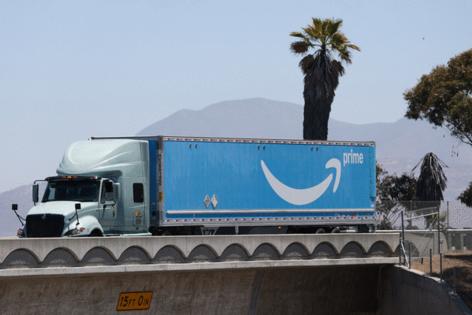On trial in Seattle? Amazon's relentless push for Prime memberships
Published in Business News
A jury will decide whether Amazon duped millions of customers into signing up for Prime memberships, in a case that kicked off this week in federal court in Seattle.
The case, filed by the Federal Trade Commission in 2023, is focused on one of the pillars of Amazon's e-commerce business.
Amazon's Prime membership, first introduced in 2005 and central to the company's growth, guarantees free, fast delivery for an annual fee of $139. The company has multiple sales events throughout the year catered toward Prime members, who flock to the online marketplace more often than non members.
The membership also includes access to Amazon's streaming platform Prime Video, grocery delivery and discounts at Amazon-owned Whole Foods.
Revenue from Prime subscriptions alone brought in more than $44.3 billion for the company last year. Amazon's total revenue in 2024 for its retail business was $530 billion.
The FTC alleged Amazon tricked customers into signing up for the membership and then made it difficult to cancel, violating the Restore Online Shoppers’ Confidence Act, a consumer-focused law passed in 2010. The online retailers at large have faced criticism and legal scrutiny over subscriptions that were easy to join but complicated to cancel.
In a trial brief last week, the FTC said Amazon knew that customers struggled to cancel its Prime subscription service, and that millions of users signed up without knowledge or consent."
Amazon denies the claims. In its own briefing last week, the company argued that the onus for subscription cancellations falls more on the customer, saying Amazon's checkout process clearly explains the terms before a customer checks out.
"Evidence that a small percentage of customers misunderstood Prime enrollment or cancellation does not prove that Amazon violated the law," the company said.
The FTC filed the lawsuit during the Biden administration and under former FTC chair Lina Khan, who rose to prominence for an article in the Yale Law Journal critiquing Amazon's business practices. Amazon's Prime subscriptions first came under FTC scrutiny in early 2021, during the final days of the first Trump administration.
U.S. District Judge John Chun ruled last week that two Amazon executives — Neil Lindsay and Jamil Ghani — will be found liable if the jury sides with FTC, because of their involvement with Prime's cancellation policy. Russell Grandinetti, a senior vice president in Amazon's international retail business, could also be found personally liable.
"The bottom line is that neither Amazon nor the individual defendants did anything wrong — we remain confident that the facts will show these executives acted properly and we always put customers first," an Amazon spokesperson said in an emailed statement.
The FTC is requesting monetary penalties, which Chun will decide on if the FTC wins.
Chun also sided with the FTC last week when he rejected Amazon's argument that Prime was not liable for violations to the Restore Online Shoppers’ Confidence Act.
Chun also admonished lawyers representing Amazon in July for withholding tens of thousands of documents from the FTC without proper justification. Chun ruled that the company's "conduct during discovery was tantamount to bad faith" and that "similar conduct may lead to more serious sanctions."
A Seattle federal court jury empaneled Monday will ultimately need to decide whether Amazon's cancellation process for Prime is "clear and conspicuous." The trial will also highlight Amazon's cancellation flow, which the FTC notes in its trial brief is known internally at the company as "Iliad" — presumably named after Homer's epic poem about the Trojan War — which the agency calls a "labyrinthian mechanism" that misleads customers.
Jury selection on Monday showed the reach of Amazon in Western Washington.
Several potential jurors had worked in the tech industry and had interactions with the company. Some had relatives or friends who worked for Amazon. Others in the panel had negative experiences with the company's marketplace; one said a decade ago that he had accidentally signed up for Prime, calling the mistake "not frustrating but a surprise before he canceled it.
Opening arguments were scheduled to begin Tuesday. The trial is expected to last for about a month.
_____
©2025 The Seattle Times. Visit seattletimes.com. Distributed by Tribune Content Agency, LLC.












Comments